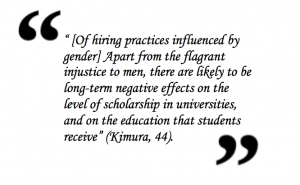Gender discrimination.
When we hear these words, most of us are immediately filled with negative emotions. Perhaps we imagine a man being selected over an equally qualified woman for a critical job position, or even a woman being harassed as she walks down the street. These are certainly examples of what gender discrimination can be. But what about a woman receiving a prestigious physics fellowship, a fellowship offered only to females? Does this also qualify as discrimination?
Equality vs. Fairness
I am a white female currently living in the United States and choosing to pursue a career in a STEM field. I have been told that, as a woman entering an area of the workplace well known for being male-dominated, I have an advantage. I can’t complain, of course, but I have to wonder: why should I have an advantage? What is it about me being a female that gives me preference over equally qualified males? The only difference between my equally qualified male peers and me is that I am a member of an underrepresented group. Girls of color are told they are at even more of an advantage – to get into top schools, to get hired for jobs in STEM – than their Caucasian and/or male peers.
It seems that in the modern university setting and workplace, there is a constant effort made to reach equality. Equal numbers of men and women, all races represented and accounted for. But is this really what we should be striving for? It is true that having a diverse environment in which to learn or work can promote creative thinking and enhance self-awareness. However, this mindset leads to the development of quotas – for gender, race, socioeconomic status, etc. – that must be considered when choosing which student to accept at a university or which candidate to hire at a company. In the pursuit of fulfilling these quotas, certain minority groups are at an advantage, and consequently, majority groups at a disadvantage.
This is especially true of the math and science fields. There is a distinct lack of women in these fields, and many scholarships and fellowships for women have been created to increase the numbers. Universities, in an effort to maintain equality and diversity, compete to attract the fewer number of competitive and interested women to their campus.
Problems with Using Quotas
Gender and race quotas allow for a diverse and enriching academic or work environment. Yet, how many qualified students or job candidates are overlooked in the search for minorities? If the opposite were to occur – say, a software company preferentially hired males or Caucasians – there would be outrage and cries of discrimination. Hiring or accepting persons preferentially on the basis of gender or race, even if those persons are members of a minority group, fits under the umbrella definition of discrimination. These practices can also be detrimental in the long run to the university or company. If that university or company in question accepts or hires a less qualified candidate for the sake of his or her gender or race, the quality of work received will likely reflect that.
There are advantages and disadvantages to using to quota system. Whether gender or race should play into the decision to hire or accept someone at all is controversial and highly debated. If we want to find the most productive, yet still diverse, environment possible, we are likely going to have to strive for a balance.
Works Cited:
Kimura, D., Ceci, S.J. (2007). “‘Underrepresentation’ or misrepresentation?”. Why Aren’t More Women in Science? Washington, DC: American Psychological Association.

